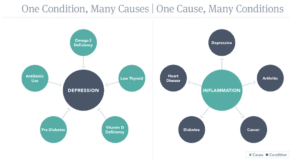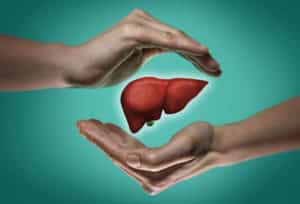You are sooo ready for bed! You climb into your cozy sheets, flip off the light, and boom – there goes that brain. Thoughts swimming all around, and all you want to do is get to bed!!
I hear ya lady. This was a big problem of mine for awhile. The good news is that there’s so much you can do to make your sleep better.
Watch, listen, or read on… There’s video for those that prefer this delivery method, or the text below if you enjoy reading the information!
BRING ON BETTER SLEEP!
What can you do to fall asleep tonight? This is what today’s blog post is all about.
Disrupted sleep is very common. One third of US adults get half of the recommended amount of sleep per night. Lack of sleep is linked with many chronic conditions, such as type 2 diabetes, heart disease, obesity, depression, and of course, energy problems.
Energy problems can manifest as mood disruption, troubles with sleep, or just feeling like you’re wired and tired… That feeling of being ramped up and wired, or feeling exhausted. There are a lot of root issues that play into energy problems and also negatively impact sleep.
CAUSES OF SLEEP PROBLEMS
What are the causes of sleep problems? Stress is probably one of the biggest factors, and this can be mental or emotional stress due to triggers occurring in life. It can also be due to physical stress in the body, caused by diet, environmental toxins, or blood sugar imbalance. This physical stress may be occurring while emotionally a person feels fine. It’s still stress, but it may not be perceived in the mind.
One thing that I experienced in dealing with my own health problems was having physical stress in my body due to gut imbalances, and noticing that I had this low level anxiety all the time… Of course I was unaware of the root causes. I just knew I had some anxiety issues. But, I didn’t understand why I felt that way because everything in my life seemed great. Why was I feeling anxious for no reason??? And yes, my sleep was horrible too… I’d lay in bed unable to fall asleep. In my case, my body was stressed due to a gut infection.
MY GUT WAS SENDING STRESS MESSAGES TO MY BRAIN, WHICH WERE CAUSING ANXIETY AND BAD SLEEP.
This is why it’s so important to dig for the root causes. Often we have symptoms that don’t seem like they’d be connected to certain areas in the body, and upon digging, we find they are. If the body is stressed, it can also cause mental/emotional stress in some cases.
WHAT’S THE DEAL WITH MELATONIN?
Melatonin, this is one of the first things most people try for falling asleep. Melatonin is best for circadian rhythm balance. If this gets out of wack, and that’s why you’re having trouble falling asleep, then melatonin can help.
I’m going to give you an example. My husband is a full-time musician, and he works four nights a week. Three nights a week, he’s at home and gets up early the next day. He needs to fall asleep, but he’s not used to going to sleep until the wee hours of the morning after playing at the club. In order to fall asleep at 10 PM, he has to take a melatonin.
And it works like a charm for him, because melatonin is good for regulating the circadian rhythm. It’s also best for help in FALLING ASLEEP. It’s not so good if somebody’s waking up at night and can’t get back to sleep. It tends to not really help as much with this. In many cases, waking in the middle of the night may be due to some other issues going on.
As for dosing melatonin, start with 1 mg, and if need be, you can go up to 3 mg. There’s not a lot of support for higher doses. If you have a really weird, wonky schedule or you work night shifts or something like that, then that’s a pretty good argument for melatonin. However, a lot of times, people take it and it doesn’t do anything, or they’re waking up in the middle of the night and it’s not helping. In these cases, it’s probably not the right option for you at this time.
TIPS TO IMPROVE SLEEP
Let’s talk about some tips to improve sleep, and then, we will discuss some supplements that may be helpful.
There’s nothing that beats stress management, sleep hygiene, and diet for supporting healthy sleep, which is why I’m going to talk about these before supplements. However, sometimes we can’t make the changes required in those areas very quickly. Some of you may be speedy in these areas, which is awesome! For others, habit change can be hard. It takes time, and that’s okay. In these cases, supplements can help in the meantime, while you integrate diet and lifestyle changes. If we know, via lab testing or some other clinical approaches, what’s going on in the body, then we can make some better recommendations as far as supplements to help with specific mechanisms that may be at play.
MEDITATION
Okay, first tip! Five to ten minutes of meditation before bed. I swear by this myself, and I love to use Insight Timer. This is an app that provides guided meditations. They have topics for meditations ranging from anxiety to sleep to just breathing. You’ll find people that you like more than others, so you can bookmark those and use those the next day. You can also search by length, and they have 1-5 minute options for different purposes. Start with just five minutes before bed.
I find that, as a mom and as someone who’s working with people one-on-one on a daily basis, that having someone else talk to me and provide a guided meditation is very rewarding. It makes me feel cared for, which is nice.
This being said, you don’t need an app. You don’t need anything like that. You just need yourself and a quiet space. You can just focus on your breathing. One great option for breath work is the 4-7-8 breath. You inhale for 4, hold gently for 7, and exhale for 8. This helps you to exhale fully. Make sure as you do this, that you are sitting tall with space for your diaphragm to expand and contract fully.
If you’re not so sure about meditation, there are other options. What do you do that you find calming and relieving? Meditation is just one option. No matter what, taking that time before bed to relax can make a BIG difference. It helps to settle your nervous system, shifting you from your sympathetic system, which is where you ‘fight, flee, or freeze’, into your parasympathetic system, which is your ‘rest and digest’ mode. Just start with 5 minutes a day!
Calming activities before sleep are part of ‘Sleep Hygiene’. We are preparing ourselves for sleep, rather than just taking our day and pulling it into bed with us… which brings us to screen time…
DISCONTINUE THE USE OF TECHNOLOGY TWO HOURS BEFORE BED
Easier said than done, right?! This is the optimal amount of time. However, I know this isn’t always p0ssible. Depending on the flow of your day, you may not have that option with work or life to be entirely off screens two hours before bed. But, if you can scoot them up earlier in the evening, it can be helpful.
One way to do this is to organize your tasks for the evening. Let’s say you clean up the kitchen, respond to some emails, look up something that you were thinking about that you need to find out online, take a shower, and get yourself ready for bed. Take these tasks, and organize them so that the technology based tasks get accomplished first. You would first respond to e-mail, then look up something online, then clean the kitchen, then shower, and then get ready for bed. And then, of course… meditate!
If there’s a TV show you want to watch, do that first. By organizing your evening this way, you get the screen time done on the front end, and then after that, you can begin to do the more relaxing activities and prepare yourself for sleep.
Little things like this can make a big difference. If we jump on our phone and check our email right before we get into bed, and there’s a new email about work or something requiring action, our mind gets going. This then interferes with sleep. So, refrain from the last minute e-mail and social media checks!
DIET AND SLEEP
What are you eating at dinner? When are you eating dinner? Blood sugar imbalance can really disrupt sleep, and likewise, if you’re not getting enough sleep, that can cause insulin resistance the next day. It’s a vicious cycle. If you’ve ever gotten a really poor night of sleep, and then you craved sugar the next day, this is likely what’s going on. So, let’s avoid this cycle. For dinner, eat a palm sized portion of protein; whatever foods that you like to eat to get protein from. Eat half a plate full of non-starchy vegetables, some healthy fat, and then an amount of carbohydrates that is appropriate to you.
I say this quite often. I do not subscribe to any specific diet. Diet is very individual, which is why I love the functional approach. This approach bases this off of your lifestyle, labs, signs and symptoms, and then tailors you diet to fit your energy and activity levels. If you’re just getting started and not sure what is best for you, start with what I described above.
Eat your dinner at least two hours before bed, and avoid refined sugars and flours. You’ll be able to digest a bit before you lay down, and also avoid a blood sugar crash in the middle of the night.
SUPPLEMENTS FOR SLEEP
The first suggestion here is magnesium glycinate. This tip is in my Wired and Tired Rescue Guide. This guide will also give you some additional tips to holistically help you get your groove back. Go download this for this tip and more! Many people are low in magnesium, so supplementing magnesium can be helpful for more than just sleep. I suggest glycinate, because glycine can be calming. We also don’t tend to get enough of it from the diet, so that’s a good form to start with.
If you go grab magnesium citrate, there’s some popular products out on the shelf, like Magnesium Calm. Magnesium citrate can have an effect on the bowels because it acts as an osmotic and pulls water into the colon. This can cause a loose stool for some people. Others are not affected in this way. If you’re constipated and you need some help with that, then take some magnesium citrate. It may help you sleep and also promote a bowel movement. In them meantime, you can work on the underlying factors happening in the body to get digestion working well.
Magnesium glycinate shouldn’t have that type of effect on the bowels and is a good option for sleep. Magnesium is involved in vitamin D metabolism, hundreds of enzyme reactions in the body, bone health, brain health, muscle relaxation, and more. We use it in our muscle cells with calcium to contract and relax the muscles. I could go on, but magnesium is a big one. If we’re low in it, we definitely want to make sure we’re getting sufficient levels of magnesium.
Another option that I get a lot of good feedback from people on is CBD oil. This is something that you can try, especially if you have physical discomfort in your body or anxious thoughts through the day. In addition, there are herbs called adaptogenic herbs. Have you heard of ashwagandha, eleuthero, or ginseng? If so, then you’ve heard of these herbs! Ashwagandha is one that has gotten more popular in the past few years. It is an adaptogenic herb that is more calming in nature and can help with sleep.
Another supplement for sleep is theanine. I just had two people this week tell me that theanine helps them a lot. This is an amino acid found high in green tea. It has a calming but focused effect. This can be taken in supplement form. Although you get it in green tea, you will also get caffeine in your tea. So, I would not drink green tea right before bed. If you’re using this for sleep, just try the theanine supplement. However, during the day, the tea may be a good option to promote focus and calm.
Another supplement I really like is phosphatidylserine. I have a blog article on phosphatidylserine, so go HERE to read more about this option. It’s really great for balancing cortisol, particularly when cortisol is spiking throughout the day. If stress is a cause of poor sleep for you, definitely READ THIS ARTICLE.
There are two products I like if you think that your stress and thus your cortisol levels are affecting your mood and your sleep. One is called Pure Encapsulations Cortisol Calm. Another is called Cortisol Manager. You can learn more about these and PURCHASE THEM HERE.
These sleep hygiene, dietary, and supplement tips will give you a start on getting and staying asleep! Sleep is really, really important, and if you’re feeling wired and tired, it’s vital to work on it. Please post your questions or your comments below. If there are things that have worked well for you, please share!
Sweet dreams lovely!
**For one-on-one help with your sleep issues, book your FREE WIRED AND TIRED TROUBLESHOOTING SESSION HERE.




